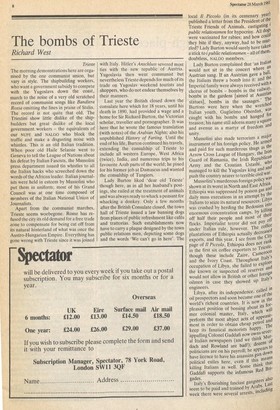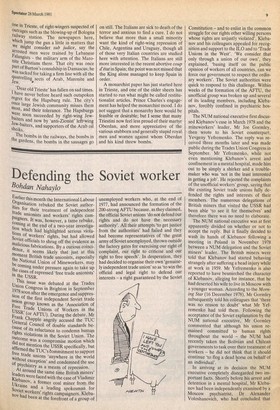The bombs of Trieste
Richard West
Trieste The morning demonstrations here are organised by the one communist union, but vary in style. The shipbuilding workers, who want a government subsidy to compete with the Yugoslays down the coast, march to the noise of a very old scratched record of communist songs like Bandiera Rossa omitting the lines in praise of Stalin. The record is not quite that old. The Triestini show little dislike of the shipbuilders but great dislike of the local government workers — the equivalents of our NUPE and NALGO who block the traffic and make a disgusting noise with whistles. This is an old Italian tradition. When poor old Haile Selassie went to Geneva to tell the League of Nations about his defeat by Italian Fascists, the Mussolini press department issued tin whistles to all the Italian hacks who screeched down the words of the African leader. Italian journalists were held in esteem by Mussolini who put them in uniform; most of his Grand Council was at one time composed of members of the Italian National Union of Journalists.
Apart from the communist marches, Trieste seems woebegone. Rome has refused the city its old demand for a free trade zone to compensate for being cut off from its natural hinterland of what was once the Austro-Hungarian Empire. Everything has gone wrong with Trieste since it was joined with Italy. Hitler's Anschluss severed most ties with the new republic of Austria. Yugoslavia then went communist but nevertheless Trieste depends for much of its trade on Yugoslav weekend tourists and shoppers, who do not endear themselves by their manners.
Last year the British closed down the consulate here which for 18 years, until his death in 1890, had provided a wage and a home for Sir Richard Burton, the Victorian scholar, traveller and pornographer. It was here that he wrote the famous translation (with notes) of the Arabian Nights; also his unpublished History of Farting. Until the end of his life, Burton continued his travels, extending the consulship of Trieste to include all western Europe, West Africa (twice), India,, and numerous trips to his favourite Arab parts of the world; he pined for his former job at Damascus and wanted the consulship of Tangiers.
Lady Burton liked 'dear old Trieste' though here, as in all her husband's postings, she railed at the treatment of animals and was always ready to whack a peasant for whacking a donkey. Only a few months after the British Consulate closed, the town hall of Trieste issued a law banning dogs from places of public refreshment like cafés and trattorias. Such establishments now have to carry a plaque designed by the town public relations men, depicting some dogs and the words 'We can't go in here'. The local 11 Piccolo (in its centenary year) published a letter from the President of the Trieste Friends of Animals, castigating l public relationsmen for hypocrisy. All dogs were vaccinated for rabies; and how could they bite if they, anyway, had to be mtlz` zled? Lady Burton would surely have taken a stick to i public relationsmen — all of them, doubtless, NALGO members.
Lady Burton complained that 'an Italian would not sit in the concert where na Austrian sang. If an Austrian gave a ball, the Italians threw a bomb into it: and the Imperial family were always received with 3 chorus of bombs — bombs in the railwaY, bombs in the gardens [aimed at Austrian statues], bombs in the sausages.' The., Burtons were here when the wretcheo Italian youth, Guglielmo Oberdan, was caught with his bombs and hanged for treason; his name still adorns many a square, and avenue as a martyr of freedom no unity. Mussolini also made terrorism a Main; instrument of his foreign policy. He armen and paid for such murderous thugs as the Arrow Cross League of Hungary, the Iron Guard of Rumania, the Irish Republican Army and the Croatian Ustashi, wilt) managed to kill the Yugoslav king and and push the country nearer to terrible civil we' Mussolini's murderous foreign policy was shown at its worst in North and East Africa,' Ethiopia was suPpressed by poison gas an' daily mass executions in an attempt by the Italians to seize its natural resources; Libya was crushed by herding the Bedouins int° enormous concentration camps, by killing off half their people and most of their flocks. Imperialist terror did not pay off under Italian rule, however. The coffee plantations of Ethiopia actually decreased exports, and this year, I see from the city page of II Piccolo, Ethiopia does not rank in the first six coffee exporters to Trieste, though these include Zaire, Cameroon and the Ivory Coast. Throughout Italy's occupation of Libya, she failed to explore the known or suspected oil reserves and would not allow in British or other foreign oilmen in case they showed up Italy's engineers. Libya, after its independence, called ia oil prospectors and soon became one of the world's richest countries. It is now in ,the pleasant position of bossing about its 0.1,-, mer colonial master, Italy, which Wi" perform the most abject acts of apeease] ment in order to obtain cheap petrol an keep its fanatical motorists happY. The appalling Colonel Gaddafi now owns sever' al Italian newspapers (and we think Mor; doch and Rowland are bad!); dozens 01 politicians are on his payroll; he appears to have licence to have his assassins gun down political exiles here, even if this means killing Italians as well. Some think that Gaddafi supports the infamous Red Bri" gades. Italy's flourishing fasciast gangsters also seem to be paid and trained by Arabs. Last week there were several arrests, including one in Trieste, of right-wingers suspected of outrages such as the blowing-up of Bologna railway station. The newspapers here, Which jump the gun a little in matters that We might consider sub judice, say the arrested men were trained by Lebanese Falangists — the military arm of the Maronite Christians there. That city was once part of Burton's consulship in Damascus; he was sacked for taking a firm line with all the quarrelling sects of Arab, Maronite and Jew.
'Dear old Trieste' has fallen on sad times. I have never before heard such outspoken regret for the Hapsburg rule. The city's °lice large Jewish community misses them most, and their tolerance. The Hapsburgs were soon succeeded by right-wing Jewbaiters and now by 'anti-Zionist' leftiwing Jew-baiters, and supporters of the Arab oil Sheiks.
The bombs in the railways, the bombs in the gardens, the bombs in the sausages go on still. The Italians are sick to death of the terror and anxious to find a cure. I do not believe that more than a small minority want the kind of right-wing repression of Chile, Argentina and Uruguay, though all of those very Italian countries are studied here with attention. The Italians are still more interested in the recent abortive coup d'etat in Spain; the point was not missed that the King alone managed to keep Spain in order.
A monarchist paper has just started here in Trieste, and one of the older sheets has started to run what might be called restitutionalist articles. Prince Charles's engagement has helped the monarchist mood. I do not suggest that a monarchy here would be feasible or desirable; but I sense that many Triestini now feel less proud of their martyr Oberdan, and more appreciative of the various stubborn and generally stupid royal men and women against whom Oberdan and his kind threw bombs.











































 Previous page
Previous page